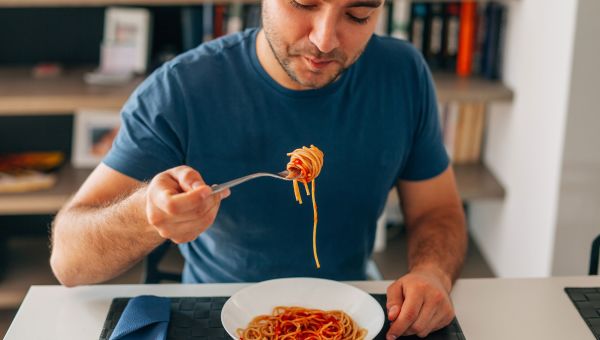Eat mindfully in 5 simple steps
Rethinking your meals could be the key to enjoying them more—and maybe losing weight in the process.
Updated on October 27, 2025

Have you ever sat watching television with a bag of potato chips and been surprised to discover the bag empty at the end of your show? If so, you know what it’s like to eat without realizing how much—or sometimes what—you’re eating. If this is a habit you’d like to break, mindful eating can help.
Mindful eating is derived from a concept known as mindfulness, which involves cultivating a full awareness of what’s going on within and around you. Mindful eating focuses on bringing attention to the present moment so you are able to wholly perceive, nonjudgmentally, what you are eating. Although weight loss can be a benefit of mindful eating, it is not the main goal.
“It’s important to be fully aware of eating and enjoying the food that's right in front of you,” says Frank Chae, MD, a bariatric surgeon with Sky Ridge Medical Center in Lone Tree, Colorado. Doing so may help you eat less and savor your meals more.
Find out how mindful eating works and learn ways to eat more consciously, increase your enjoyment of food, and, in some cases, help manage your weight.

The Benefits of Being Present
Mindfulness puts an emphasis on relaxation and alertness, which you can achieve by paying close attention to your experience in the present moment.
There are a number of ways to practice mindfulness. Mindfulness meditation is the process of sitting quietly, breathing deeply, and noticing your thoughts and sensations passing without judging them—or judging yourself for having them.
It’s important to remember that there is no wrong way to practice general mindfulness. If you’re sitting quietly and observing what’s happening around you in that moment, you’re doing just fine. That said, if you are using mindfulness as part of a clinical program, it’s wise to follow the recommendations of your healthcare provider (HCP).
Mindfulness might improve aspects of both your physical and mental health, including:
- Stress levels
- Sleep
- Cognitive focus and memory
- Anxiety
- Depression
When applied to your food and eating habits, mindfulness can make you more aware of what you are putting in your body. To make the most of mindful eating, Dr. Chae recommends practicing other types of mindfulness, like meditation, prayer, or yoga. “I think these go with mindful eating habits. They're all complementary,” he says.

Start With a Shopping List
The first step in eating mindfully is thinking about the wholesome foods you want on your plate. A healthy diet includes an abundance of fruits, vegetables, whole grains, and lean protein, and is light in saturated fats, sodium, and added sugars. Think about the meals you would like to eat for the coming week, gather nutritious recipes, and add those ingredients to your shopping list.
At the grocery store, start by strolling the aisles along the perimeter, where the most unprocessed foods are typically located. Load your cart with fresh produce, low-fat dairy, and lean protein sources like eggs, chicken breast, and ground turkey, before heading down the center aisles for healthy picks like beans and nuts. The candy aisle can be tempting, but before making an impulse buy, slow down and make a conscious choice to stick to the items on your list.

Measure the Perfect Portion
How you serve your food and what you serve it on may affect just how much you eat.
In a 2022 review of 23 studies published in the journal Nutrients, researchers found that using special portion control plates increased nutrition knowledge in both adults and kids. It helped them be mindful of how much they should be eating and make better choices.
It may also help to simply use a smaller plate to control your portion sizes. While research on using smaller plates is mixed, some studies suggest they may help you to eat less while increasing your satisfaction with the meal.
Another strategy: Once you add the proper portion size to your plate, leave serving dishes on the kitchen counter. If you have to get up from the table, you may be less inclined to go back for a second (or third) helping.
Where you eat may affect how mindful you are, too. Chae recommends keeping your meals “confined to the kitchen or dining room, and not spilling into the living room, bedroom, or the family room.”

Go Slow and Steady
Try to avoid racing through your meals. Eating slowly and deliberately may help you consume fewer calories. A 2019 study published in Nutrients found that people who ate meals slowly reported greater feelings of fullness, and that afterwards, their bodies had lower levels of the hunger hormone ghrelin. They also ended up eating 25 percent fewer snacks than people who at their meals quickly.
“I think most of us fall into patterns of being in a rush. If you have 10 minutes to eat, there’s a tendency to wolf it down in five,” Chae says. “I think sitting down and focusing on tasting the food goes a long way.”
If you’re new to mindful eating, here are simple ways to take your time during meals:
- Try using chopsticks instead of a fork
- Use a smaller utensil, or take smaller bites
- Chew your food carefully before swallowing

Savor the Flavor
Sensory awareness—taking special notice of sights, smells, and tastes—is another form of mindfulness that can make mealtimes a pleasure. The senses of sight and smell are most involved in anticipating the flavors of food, choosing which foods we eat, and priming our appetite. A more aesthetically pleasing food increases our appetite more than a food that is lacking aesthetics.
A helpful hint for savoring your food’s flavor: Hold the food in your mouth until you are able to identify each of the ingredients.

Avoid Distractions
It can be tough to pay attention to the tastes and textures of your food if your attention is focused on a smartphone or television. “When you’re eating, just eat. Don't multitask,” Chae says. “Don’t answer your phone, reply to emails, make phone calls, or watch TV.”
While it’s true that distractions affect eating patterns, the evidence is mixed regarding whether they cause you to eat more or less. Some studies have found that watching television during a meal increases food intake, for example. But other research suggests that the level of engagement in a distraction matters. People who are highly invested in an activity may not pay attention to their food, ultimately eating less.
Regardless, focusing on your food helps you make better and more mindful food choices. Before you pick up your fork, set down your cell phone, put the book back on the shelf, step away from the TV, and remind yourself to eat more mindfully.

Kabat-Zinn, J. Wherever You Go, There You Are. Hachette Books; 1994.
Nelson JB. Mindful Eating: The Art of Presence While You Eat. Diabetes Spectr. 2017;30(3):171-174.
Wielgosz J, Goldberg SB, Kral, TR, et al. Mindfulness meditation and psychopathology. Annual review of clinical psychology. 2019;15:285-316.
Alhawatmeh HN, Rababa M, Alfaqih M, et al. The Benefits of Mindfulness Meditation on Trait Mindfulness, Perceived Stress, Cortisol, and C-Reactive Protein in Nursing Students: A Randomized Controlled Trial. Advances in Medical Education and Practice. 2022;13:47-58.
Gobbo MM, Uehara GM, Sant’Anna ME, et a. Meditation and Sleep Quality: Integrative Review. Research, Society and Development. 2023;12(2):e19312240186.
Strohmaier S. The Relationship Between Doses of Mindfulness-ased Programs and Depression, Anxiety, Stress, and Mindfulness: A Dose-Response Meta-Regression of Randomized Controlled Trials. Mindfulness. 2020;11:1315–1335.
Dubowitz T, Cohen DA, Huang CY, et al. Using a Grocery List Is Associated With a Healthier Diet and Lower BMI Among Very High-Risk Adults. J Nutr Educ Behav. 2015;47(3):259-264.
Dhuria P, Lawrence W, Crozier S, et al. Women's perceptions of factors influencing their food shopping choices and how supermarkets can support them to make healthier choices. BMC Public Health. 2021;21(1):1070.
Jia SS, Liu Q, Allman-Farinelli M, et al. The Use of Portion Control Plates to Promote Healthy Eating and Diet-Related Outcomes: A Scoping Review. Nutrients. 2022;14(4):892.
Hawton K, Ferriday D, Rogers P, et al. Slow Down: Behavioural and Physiological Effects of Reducing Eating Rate. Nutrients. 2018;11(1):50.
Forde CG, de Graaf K. Influence of Sensory Properties in Moderating Eating Behaviors and Food Intake. Front Nutr. 2022;9:841444.
Liguori CA, Nikolaus CJ, Nickols-Richardson SM. Cognitive Distraction at Mealtime Decreases Amount Consumed in Healthy Young Adults: A Randomized Crossover Exploratory Study. J Nutr. 2020;150(5):1324-1329.
Mathur U, Stevenson RJ. Television and eating: repetition enhances food intake. Front Psychol. 2015;6:1657.
More On


video

article

slideshow


video


video
